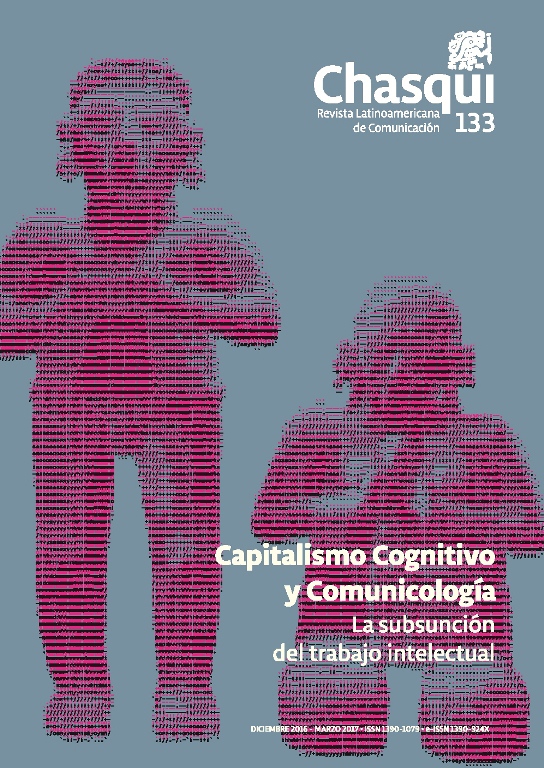Workers cooperatives in software and computer services: subversion to cognitive capitalism?
DOI:
https://doi.org/10.16921/chasqui.v0i133.2930Keywords:
technological cooperatives, free software, work, collective appropriationAbstract
The software and informatics services industry in Argentina maintain sustained growth. A recent trend is the creation of the Argentine Federation of Worker Cooperatives in Technology, Innovation and Knowledge (FACTTIC), which promotes a model based on technology development and free software. The article explores entrepreneurships from the central region to analyze their cooperative conformation, forms of work organization, working conditions and innovative initiatives. The development of these experiences is set in a context of cognitive capitalism, in his dual role of commodification of knowledge and exploitation of immaterial labor. Ongoing research is based in interviews to referents, web log analysis and secondary sources.References
ACI [Alianza Cooperativa Internacional] (1995). Declaración sobre la identidad y principios cooperativos. Manchester: II Asamblea General. Recuperado de http://bit.ly/1Izbosy.
Antunes, R. & Braga, R. (2009). Infoproletários: Degradação real de trabalho virtual. São Paulo: Boitempo.
Berti, N. (2010). Limits to unionizing. The case of the software and informatics services in Argentina. Proceedings 17 ISA World Congress of Sociology. Gotemburgo: ISA.
Blondeau, O.; Dyer-Witheford, N.; Vercellone, C.; Kyrou, A.; Corsani, A.; Rullani, E.; Moulier Boutang, Y. & Lazzarato, M. (2004). Capitalismo Cognitivo, propiedad intelectual y creación colectiva. Madrid: Traficantes de sueños.
Boldrin, M. & Levine, D. K. (2008). Against Intellectual Monopoly. New York: Cambridge University Press.
Bollier, D. & Helfrich, S. (comps.) (2014). Wealth of the Commons: A World Beyond Market and State. London: Levellers Press.
Busarovs, A. (2013). Open innovation: current trends and future perspectives. Humanities and Social Sciences, 21 (2), 103–119.
Castells, M. (1999). La era de la información. Vol. I: La sociedad red. México: Siglo Veintiuno Editores.
Chesbrough, H. W. (2003). Open Innovation: The new imperative for creating and profiting from technology. Boston: Harvard Business School Press.
Dyer-Witheford, N. (2004). Sobre la contestación al capitalismo cognitivo. Composición de clase de la industria de los videojuegos y de los juegos de ordenador. En O. Blondeau et al., Capitalismo Cognitivo, propiedad intelectual y creación colectiva. Madrid: Traficantes de sueños.
Falero, A. (2012). Los enclaves informacionales de la periferia capitalista: el caso de Zonamérica en Uruguay. Un enfoque desde la Sociología. Montevideo: Universidad de la República Oriental del Uruguay/ CSIC.
Hardt, M. & Negri, A. (2002). Imperio. Buenos Aires: Paidós.
Hess, C. (2008). Mapping the New Commons. 12th Biennial Conference of the International Association for the Study of the Commons. England: University of Gloucestershire.
INAES [Instituto Nacional de Asociativismo y Economía Social] (2008). Las cooperativas y Mutuales en la República Argentina. Reempadronamiento Nacional y Censo Económico Sectorial de Cooperativas y Mutuales. Recuperado de www.inaes.gov.ar.
Lazzarato, M. & Negri, A. (2001). Trabajo inmaterial. Formas de vida y producción de subjetividad. Río de Janeiro: DP&A Editora.
Montes Cató, J. S. [coord.] (2010). El trabajo en el Capitalismo Informacional. Los trabajadores de la industria del software. Benavídez: Poder y trabajo editores.
Montes Cató, J. S. (2011). El trabajo en la sociedad de la información: desafíos para el movimiento obrero. Kairos: Revista de temas sociales, (27) 4 84-99.
Morero, H., & Borrastero, C. (2015). Modificaciones en la organización del trabajo en empresas productoras de software abierto y formas de apropiación. Actas Vincular Córdoba. Jornadas de articulación público-privada para la innovación. Córdoba: Universidad Nacional de Córdoba.
Negri, A. (2007). Goodbye Mr. Socialism. La crisis de la izquierda y los nuevos movimientos revolucionarios. Conversaciones con Raf Valvola Scelsi. Barcelona: Paidós.
Pal, N. & Madan Mohan, T. (2002). Competing on open source: Strategies and practise. Bangalore: Indian Institute of Management Bangalore.
Pereira, I.; Seiceira, F.; Egreja, C. & Abrantes, P. (2007). O software livre e as empresas informáticas: Das tensões latentes às soluções híbridas. Lisboa: Centro de Investigação e Estudos de Sociologia.
P2P Foundation (2016). Free Software Cooperatives. Recuperado el 11 de mayo 2016, de http://bit.ly/2gG8Ow6.
Rullani, E. (2004). El capitalismo cognitivo ¿un deja-vu?. En O. Blondeau et al., Capitalismo Cognitivo, propiedad intelectual y creación colectiva. Madrid: Traficantes de sueños.
Sierra Caballero, F. (Coord.) (2016). Capitalismo Cognitivo y Economía Social del conocimiento. La lucha por el código. Quito: Ediciones CIESPAL.
Tuomi, I. (2006). Networks of Innovation. Change and Meaning in the Age of the Internet. New York: Oxford University Press.
Usuaria Research (2016) La Visión TIC de los CIOs. Año II - Volumen I. Recuperado de http://bit.ly/2hLb5Cc.
Vercellone, C. (2004). Las políticas de desarrollo en tiempos del capitalismo cognitivo. En O. Blondeau et al., Capitalismo Cognitivo, propiedad intelectual y creación colectiva. Madrid: Traficantes de sueños.
Von Hippel, E. & Von Krogh, G. (2003). Open Source Software and the “Private-Collective” Innovation Model: Issues for Organization Science. Organization Science, 14 (2), 209–223.
Wright, E. O. (2010). Envisioning real utopias. London: Verso.
Zanotti, A. (2014). Desarrollo colaborativo de software libre en la Argentina: la experiencia de un hackatón cordobés. Question, 44 (1), 373-384.
Zukerfeld, M. (2010). Cinco Hipótesis sobre el Trabajo Informacional. Aproximaciones a la caracterización del mundo laboral en el Capitalismo Cognitivo. Revista Electrónica Gestión de las Personas y Tecnología, 9, 76-85.
Downloads
Published
Issue
Section
License
- Authors retain copyright and grant the journal right of first publication with the work simultaneously licensed under a Creative Commons Attribution-NoDerivs License (CC BY-ND) that allows others to share the work with an acknowledgement of the work's authorship and initial publication in this journal.
- Authors are able to enter into separate, additional contractual arrangements for the non-exclusive distribution of the journal's published version of the work (e.g., post it to an institutional repository or publish it in a book), with an acknowledgement of its initial publication in this journal.
- Authors are permitted and encouraged to post their work online.

